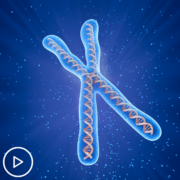What Is the Impact of Cytogenetics on AML Care?
What Is the Impact of Cytogenetics on AML Care? from Patient Empowerment Network on Vimeo.
Understanding the cytogenetics of your acute myeloid leukemia (AML) can help determine which treatment option might be best for you. Registered nurse Mayra Lee defines this complex term and the role it plays in AML care.
Mayra Lee, RN, is an outpatient clinic nurse at Moffitt Cancer Center. Learn more about Mayra Lee.
Related Resources

Why Cytogenetics and Molecular Profiling Necessary for AML Patients |

|

Predictive (Familial) Genetic Testing vs. Cancer Genetic Testing: What’s the Difference? |
Transcript:
Cytogenetics would be the term that I would say patients are unaware of and don’t understand it quite often. It’s probably the first time you hear it when you come and sit down and we talk about the disease because the first thing you want to know is what is my prognosis and what is the treatment. Well, a lot of that is made through the cytogenetics of the disease.
We use these terms and we don’t often explain what all of that means. And what that means is that the disease itself has chromosomes, has mutations, has genetic information that will help us determine which treatment is a better option for you or is there a genetic mutation that you perhaps have that we now have medications that are used to treat that genetic mutation as a said just a few seconds ago. Like for the three, if you have that mutation, we now have medication to treat that where we didn’t have that five years ago or even four years ago.
So, that terminology of cytogenetic and biomarkers are very new. They’re not something that the general public knows or understands very well.
But when you come to academic centers like where I’m at right now that is all we’re going to talk to you about because we want to do personalized medicine. And personalized medicine means what is it that your disease looks like because your disease does not look like the other AML patients. Your disease is your disease and it looks different and it’s going to behave differently. And so, we want to know about those mutations. So, so much of your treatment, so much of the prognosis is so closely linked to that that I think it’s an important thing to know. It’s important to understand it. It’s important to ask. It’s important to pause your doctor and your nurses and say, “I don’t understand what you mean by that. What does that word mean? Can you explain that to me?”



